Marshall Hodgson. Rethinking World History: Essays on Europe, Islam and World History
Подождите немного. Документ загружается.

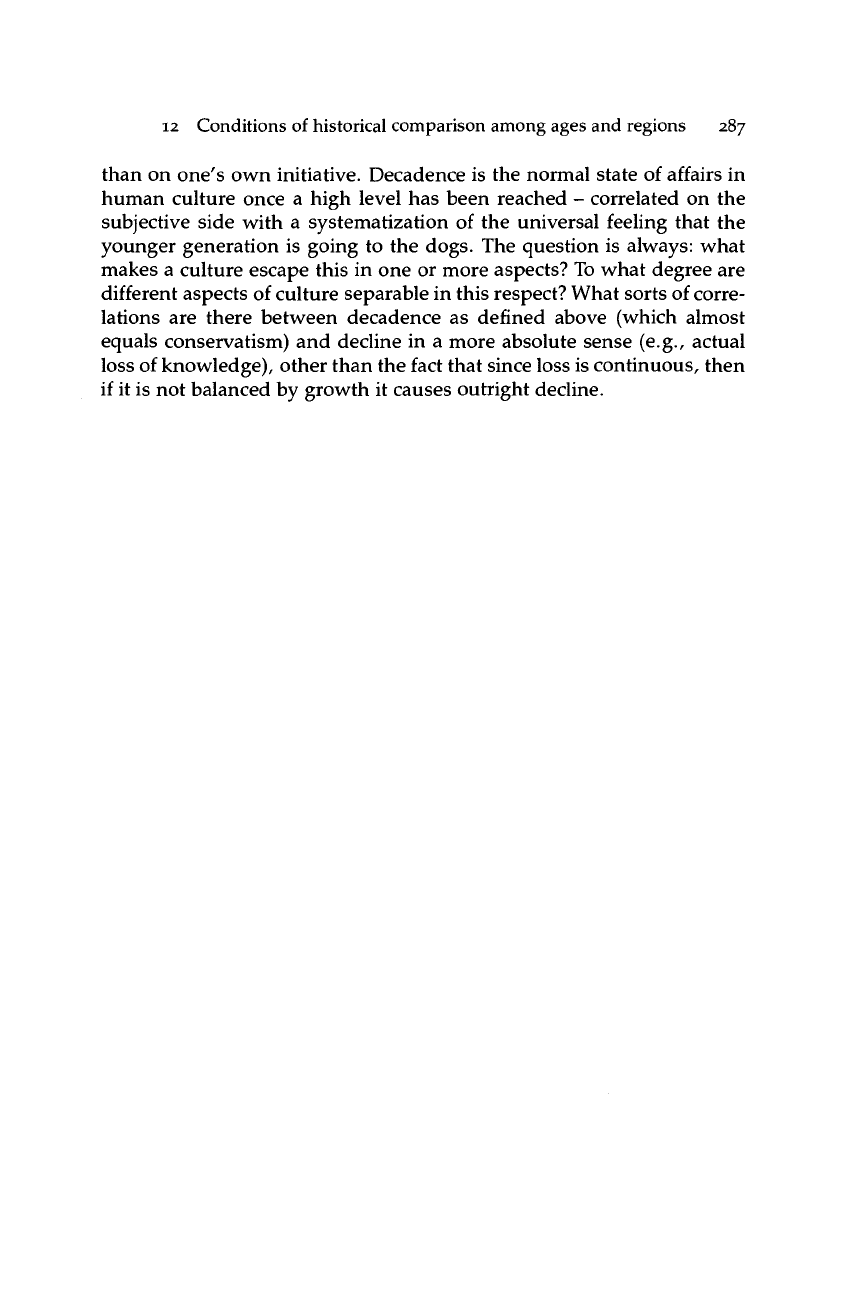
12 Conditions of historical comparison among ages and regions 287
than on one's own initiative. Decadence is the normal state of affairs in
human culture once a high level has been reached - correlated on the
subjective side with a systernatization of the universal feeling that the
younger generation is going to the dogs. The question is always: what
makes a culture escape this in one or more aspects? To what degree are
different aspects of culture separable in this respect? What sorts of corre-
lations are there between decadence as defined above (which almost
equals conservatism) and decline in a more absolute sense (e.g., actual
loss of knowledge), other than the fact that since loss is continuous, then
if it is not balanced by growth it causes outright decline.
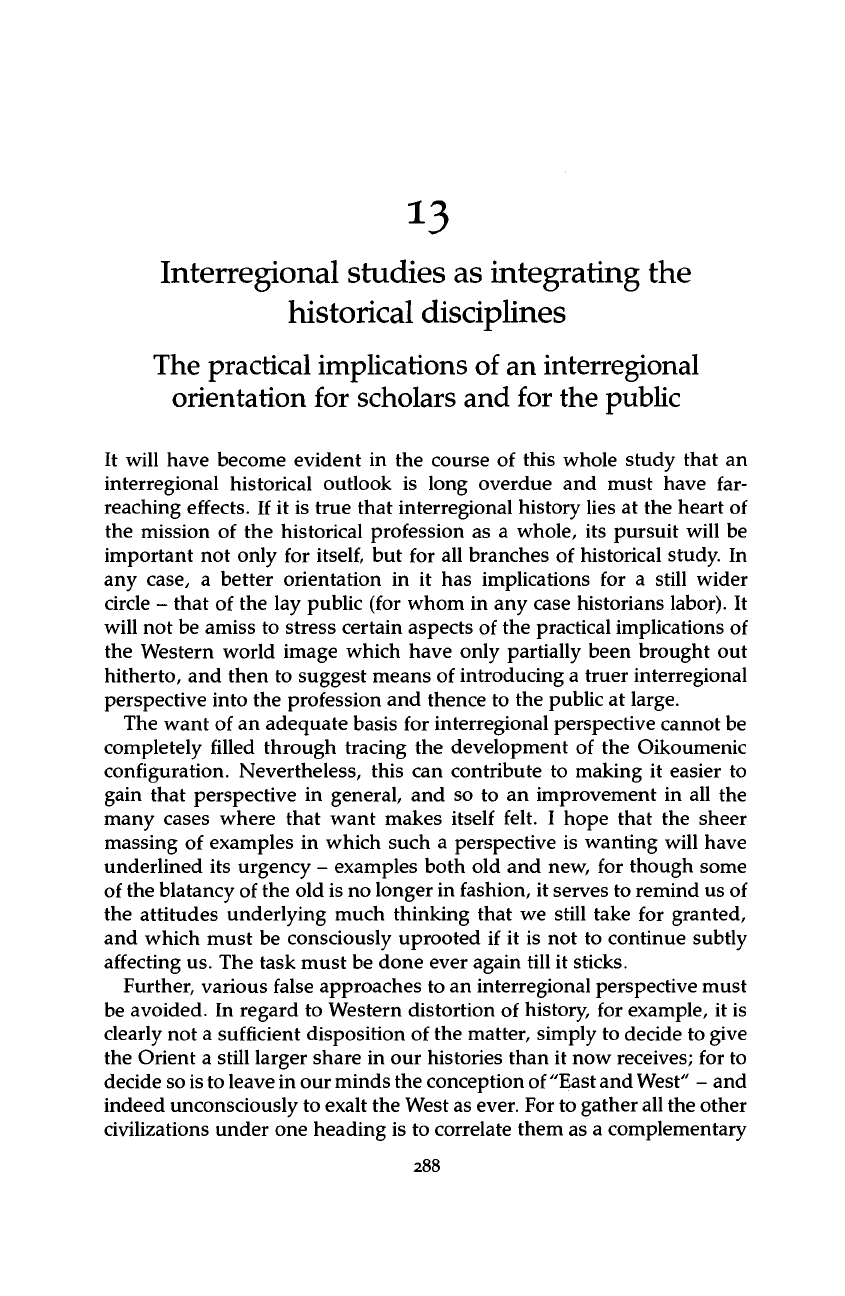
13
Interregional studies as integrating the
historical disciplines
The practical implications of an interregional
orientation for scholars and for the public
It will have become evident in the course of this whole study that an
interregional historical outlook is long overdue and must have far-
reaching effects. If it is true that interregional history lies at the heart of
the mission of the historical profession as a whole, its pursuit will be
important not only for
itself,
but for all branches of historical study. In
any case, a better orientation in it has implications for a still wider
circle - that of the lay public (for whom in any case historians labor). It
will not be amiss to stress certain aspects of the practical implications of
the Western world image which have only partially been brought out
hitherto, and then to suggest means of introducing a truer interregional
perspective into the profession and thence to the public at large.
The want of an adequate basis for interregional perspective cannot be
completely filled through tracing the development of the Oikoumenic
configuration. Nevertheless, this can contribute to making it easier to
gain that perspective in general, and so to an improvement in all the
many cases where that want makes itself felt. I hope that the sheer
massing of examples in which such a perspective is wanting will have
underlined its urgency - examples both old and new, for though some
of the blatancy of the old is no longer in fashion, it serves to remind us of
the attitudes underlying much thinking that we still take for granted,
and which must be consciously uprooted if it is not to continue subtly
affecting us. The task must be done ever again till it sticks.
Further, various false approaches to an interregional perspective must
be avoided. In regard to Western distortion of history, for example, it is
clearly not a sufficient disposition of the matter, simply to decide to give
the Orient a still larger share in our histories than it now receives; for to
decide
so is
to leave in our minds the conception of "East and
West"
- and
indeed unconsciously to exalt the West as ever. For to gather all the other
civilizations under one heading is to correlate them as a complementary
288
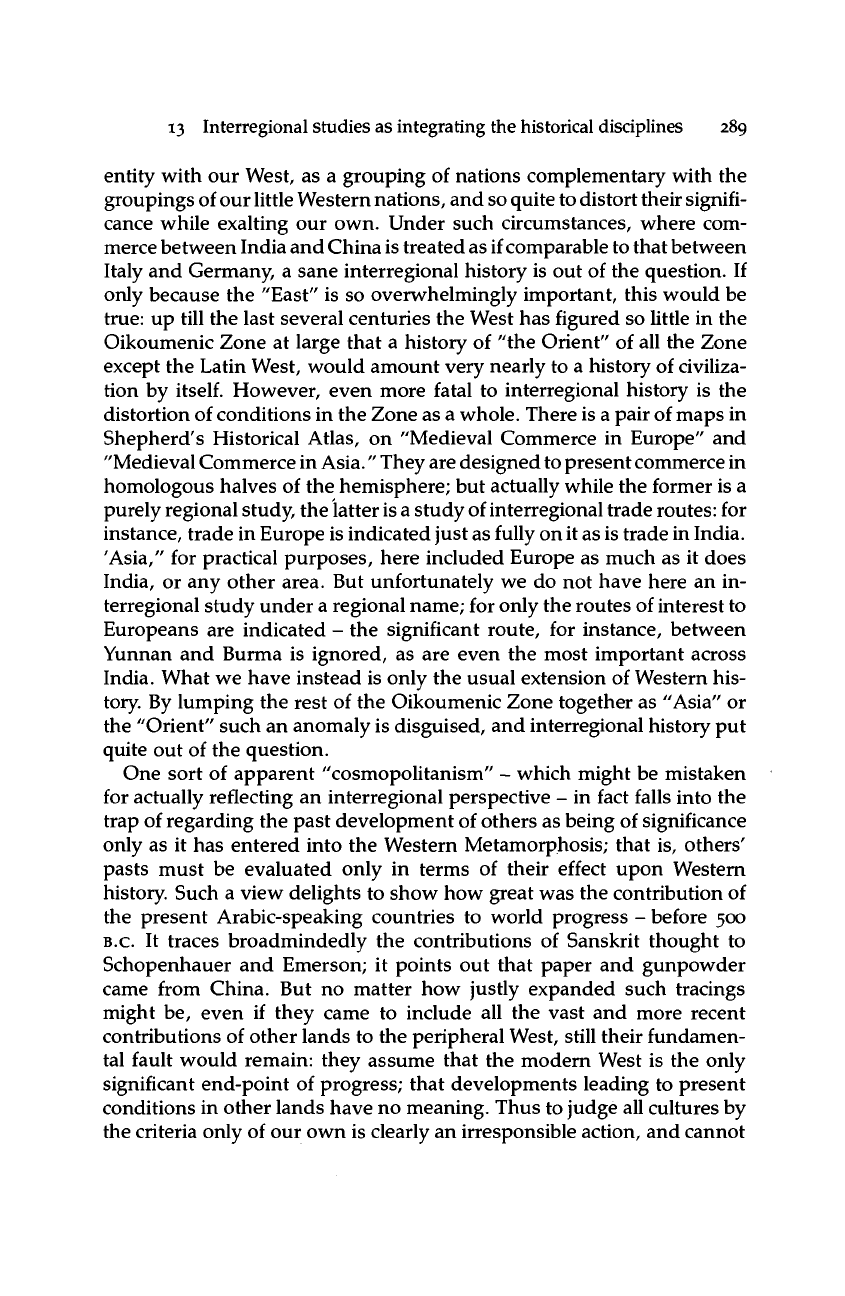
13 Interregional studies as integrating the historical disciplines 289
entity with our West, as a grouping of nations complementary with the
groupings of our little Western
nations,
and
so
quite to distort their signifi-
cance while exalting our own. Under such circumstances, where com-
merce between India and China
is
treated
as
if comparable to that between
Italy and Germany, a sane interregional history is out of the question. If
only because the "East" is so overwhelmingly important, this would be
true:
up till the last several centuries the West has figured so little in the
Oikoumenic Zone at large that a history of "the Orient" of all the Zone
except the Latin West, would amount very nearly to a history of civiliza-
tion by
itself.
However, even more fatal to interregional history is the
distortion of conditions in the Zone as a whole. There is a pair of maps in
Shepherd's Historical Atlas, on "Medieval Commerce in Europe" and
"Medieval Commerce in Asia." They are designed
to
present commerce in
homologous halves of the hemisphere; but actually while the former is a
purely regional study, the latter
is
a study of interregional trade
routes:
for
instance, trade in Europe is indicated just as fully on it as is trade in India.
'Asia," for practical purposes, here included Europe as much as it does
India, or any other area. But unfortunately we do not have here an in-
terregional study under a regional name; for only the routes of interest to
Europeans are indicated - the significant route, for instance, between
Yunnan and Burma is ignored, as are even the most important across
India. What we have instead is only the usual extension of Western his-
tory. By lumping the rest of the Oikoumenic Zone together as "Asia" or
the "Orient" such an anomaly is disguised, and interregional history put
quite out of the question.
One sort of apparent "cosmopolitanism" - which might be mistaken
for actually reflecting an interregional perspective - in fact falls into the
trap of regarding the past development of others as being of significance
only as it has entered into the Western Metamorphosis; that is, others'
pasts must be evaluated only in terms of their effect upon Western
history. Such a view delights to show how great was the contribution of
the present Arabic-speaking countries to world progress - before 500
B.C.
It traces broadmindedly the contributions of Sanskrit thought to
Schopenhauer and Emerson; it points out that paper and gunpowder
came from China. But no matter how justly expanded such tracings
might be, even if they came to include all the vast and more recent
contributions of other lands to the peripheral West, still their fundamen-
tal fault would remain: they assume that the modern West is the only
significant end-point of progress; that developments leading to present
conditions in other lands have no meaning. Thus to judge all cultures by
the criteria only of our own is clearly an irresponsible action, and cannot
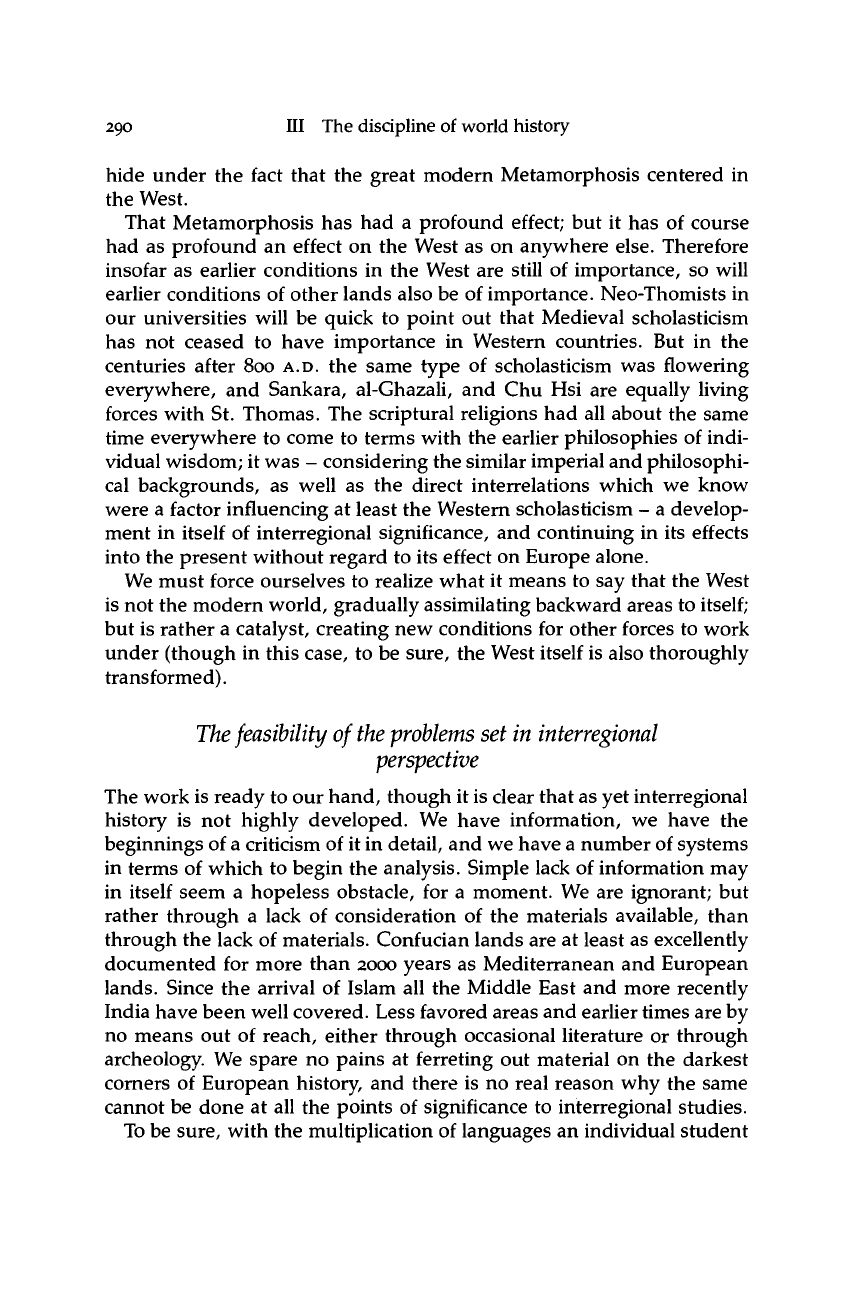
290 III The discipline of world history
hide under
the
fact that
the
great modern Metamorphosis centered
in
the West.
That Metamorphosis
has had a
profound effect;
but it has of
course
had
as
profound
an
effect
on the
West
as on
anywhere else. Therefore
insofar
as
earlier conditions
in the
West
are
still
of
importance,
so
will
earlier conditions
of
other lands also
be of
importance. Neo-Thomists
in
our universities will
be
quick
to
point
out
that Medieval scholasticism
has
not
ceased
to
have importance
in
Western countries.
But in the
centuries after
800
A.D.
the
same type
of
scholasticism
was
flowering
everywhere,
and
Sankara, al-Ghazali,
and Chu Hsi are
equally living
forces with
St.
Thomas.
The
scriptural religions
had all
about
the
same
time everywhere
to
come
to
terms with
the
earlier philosophies
of
indi-
vidual wisdom;
it
was
-
considering the similar imperial and philosophi-
cal backgrounds,
as
well
as the
direct interrelations which
we
know
were
a
factor influencing
at
least
the
Western scholasticism
- a
develop-
ment
in
itself
of
interregional significance,
and
continuing
in its
effects
into
the
present without regard
to its
effect
on
Europe alone.
We must force ourselves
to
realize what
it
means
to say
that
the
West
is
not the
modern world, gradually assimilating backward areas
to itself;
but
is
rather
a
catalyst, creating
new
conditions
for
other forces
to
work
under (though
in
this case,
to be
sure,
the
West itself
is
also thoroughly
transformed).
The feasibility
of
the problems
set in
interregional
perspective
The work is ready
to our
hand, though
it
is clear that as yet interregional
history
is not
highly developed.
We
have information,
we
have
the
beginnings
of
a criticism
of
it
in
detail,
and
we have
a
number
of
systems
in terms
of
which
to
begin
the
analysis. Simple lack
of
information
may
in itself seem
a
hopeless obstacle,
for a
moment.
We are
ignorant;
but
rather through
a
lack
of
consideration
of the
materials available, than
through
the
lack
of
materials. Confucian lands
are at
least
as
excellently
documented
for
more than 2000 years
as
Mediterranean
and
European
lands.
Since
the
arrival
of
Islam
all the
Middle East
and
more recently
India have been well covered. Less favored areas
and
earlier times are by
no means
out of
reach, either through occasional literature
or
through
archeology.
We
spare
no
pains
at
ferreting
out
material
on the
darkest
corners
of
European history,
and
there
is no
real reason
why the
same
cannot
be
done
at all the
points
of
significance
to
interregional studies.
To
be
sure, with
the
multiplication
of
languages
an
individual student
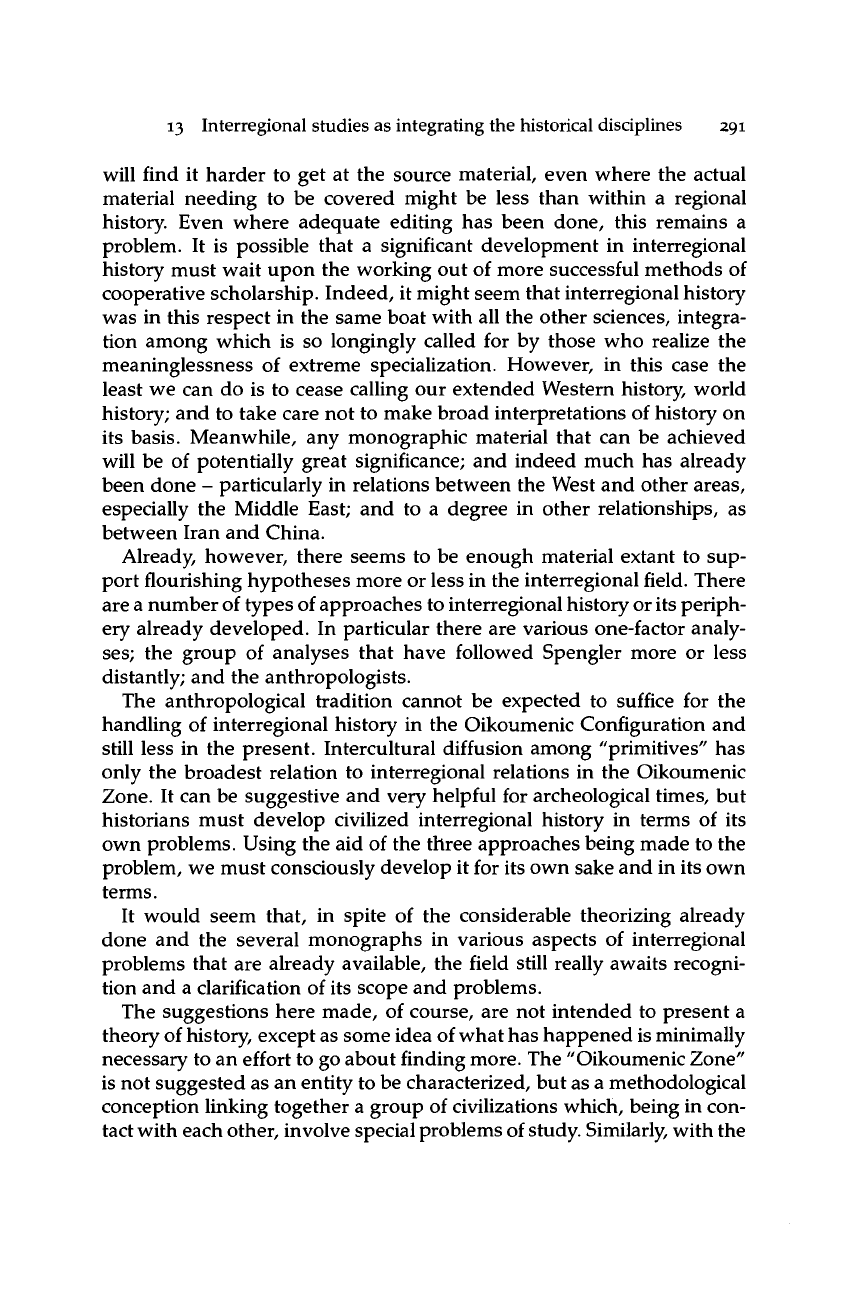
13 Interregional studies as integrating the historical disciplines 291
will find it harder to get at the source material, even where the actual
material needing to be covered might be less than within a regional
history. Even where adequate editing has been done, this remains a
problem. It is possible that a significant development in interregional
history must wait upon the working out of more successful methods of
cooperative scholarship. Indeed, it might seem that interregional history
was in this respect in the same boat with all the other sciences, integra-
tion among which is so longingly called for by those who realize the
meaninglessness of extreme specialization. However, in this case the
least we can do is to cease calling our extended Western history, world
history; and to take care not to make broad interpretations of history on
its basis. Meanwhile, any monographic material that can be achieved
will be of potentially great significance; and indeed much has already
been done - particularly in relations between the West and other areas,
especially the Middle East; and to a degree in other relationships, as
between Iran and China.
Already, however, there seems to be enough material extant to sup-
port flourishing hypotheses more or less in the interregional field. There
are a number of types of approaches to interregional history or its periph-
ery already developed. In particular there are various one-factor analy-
ses;
the group of analyses that have followed Spengler more or less
distantly; and the anthropologists.
The anthropological tradition cannot be expected to suffice for the
handling of interregional history in the Oikoumenic Configuration and
still less in the present. Intercultural diffusion among "primitives" has
only the broadest relation to interregional relations in the Oikoumenic
Zone. It can be suggestive and very helpful for archeological times, but
historians must develop civilized interregional history in terms of its
own problems. Using the aid of the three approaches being made to the
problem, we must consciously develop it for its own sake and in its own
terms.
It would seem that, in spite of the considerable theorizing already
done and the several monographs in various aspects of interregional
problems that are already available, the field still really awaits recogni-
tion and a clarification of its scope and problems.
The suggestions here made, of course, are not intended to present a
theory of history, except as some idea of what has happened is minimally
necessary to an effort to go about finding more. The "Oikoumenic Zone"
is not suggested as an entity to be characterized, but as a methodological
conception linking together a group of civilizations which, being in con-
tact with each other, involve special problems of
study.
Similarly, with the
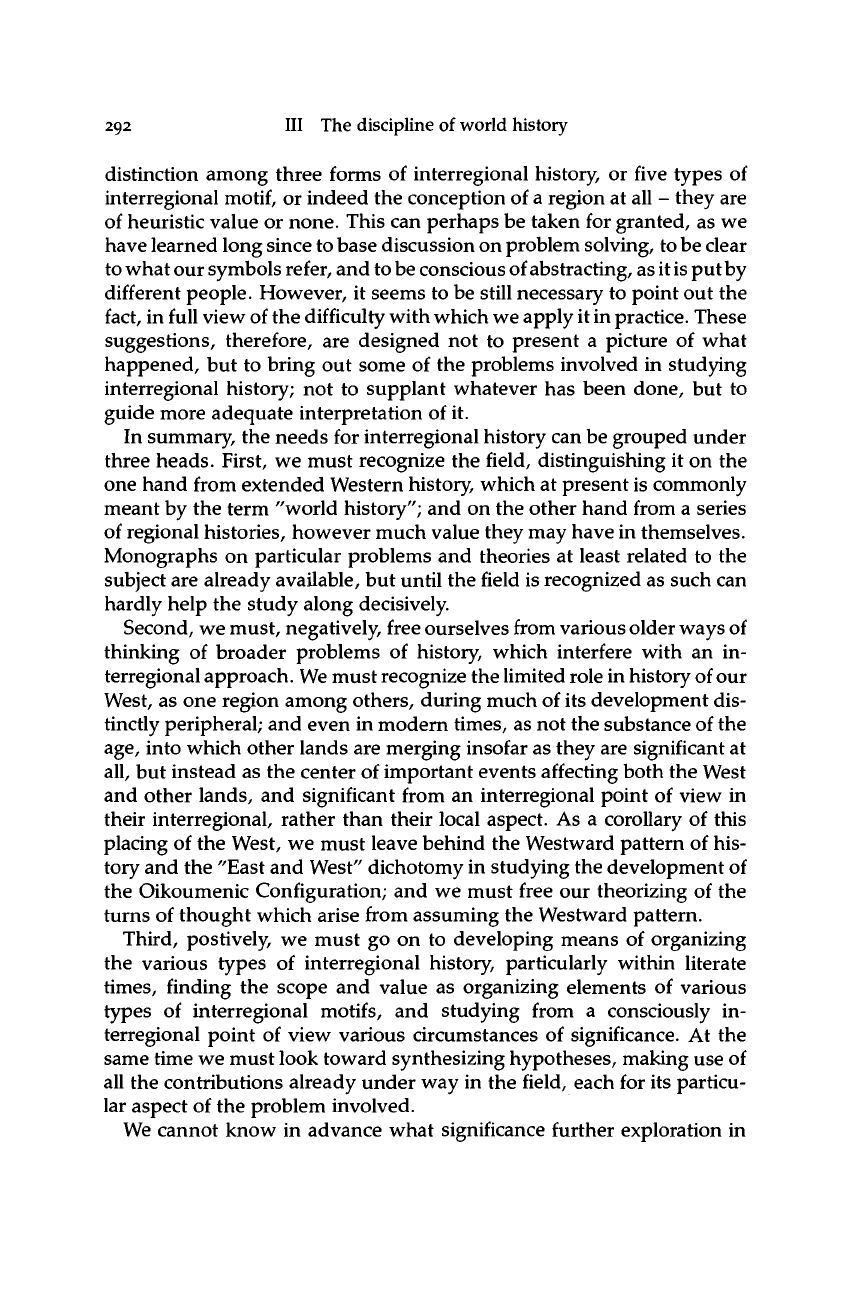
292 III The discipline of world history
distinction among three forms
of
interregional history,
or
five types
of
interregional
motif, or
indeed
the
conception
of
a region
at
all
-
they
are
of heuristic value
or
none. This
can
perhaps
be
taken
for
granted,
as we
have learned long since to base discussion on problem solving, to be clear
to what our symbols refer, and
to
be conscious of abstracting,
as
it
is
put by
different people. However,
it
seems
to be
still necessary
to
point
out the
fact, in full view
of
the difficulty with which we apply it in
practice.
These
suggestions, therefore,
are
designed
not to
present
a
picture
of
what
happened,
but to
bring
out
some
of the
problems involved
in
studying
interregional history;
not to
supplant whatever
has
been done,
but to
guide more adequate interpretation
of it.
In summary,
the
needs
for
interregional history can be grouped under
three heads. First,
we
must recognize
the
field, distinguishing
it on the
one hand from extended Western history, which
at
present is commonly
meant
by the
term "world history";
and on the
other hand from
a
series
of regional histories, however much value they may have
in
themselves.
Monographs
on
particular problems
and
theories
at
least related
to the
subject are already available,
but
until
the
field
is
recognized
as
such can
hardly help
the
study along decisively.
Second, we must, negatively, free ourselves from various older ways of
thinking
of
broader problems
of
history, which interfere with
an in-
terregional approach.
We
must recognize the limited role in history of our
West,
as one
region among others, during much
of
its development dis-
tinctly peripheral;
and
even
in
modern times, as
not
the substance
of
the
age,
into which other lands
are
merging insofar
as
they are significant
at
all,
but
instead
as the
center
of
important events affecting both
the
West
and other lands,
and
significant from
an
interregional point
of
view
in
their interregional, rather than their local aspect.
As a
corollary
of
this
placing
of the
West,
we
must leave behind
the
Westward pattern
of
his-
tory
and the
"East
and
West" dichotomy
in
studying the development of
the Oikoumenic Configuration;
and we
must free
our
theorizing
of the
turns
of
thought which arise from assuming
the
Westward pattern.
Third, postively,
we
must
go on to
developing means
of
organizing
the various types
of
interregional history, particularly within literate
times,
finding
the
scope
and
value
as
organizing elements
of
various
types
of
interregional motifs,
and
studying from
a
consciously
in-
terregional point
of
view various circumstances
of
significance.
At the
same time we must look toward synthesizing hypotheses, making use of
all
the
contributions already under way
in the
field, each
for its
particu-
lar aspect
of the
problem involved.
We cannot know
in
advance what significance further exploration
in
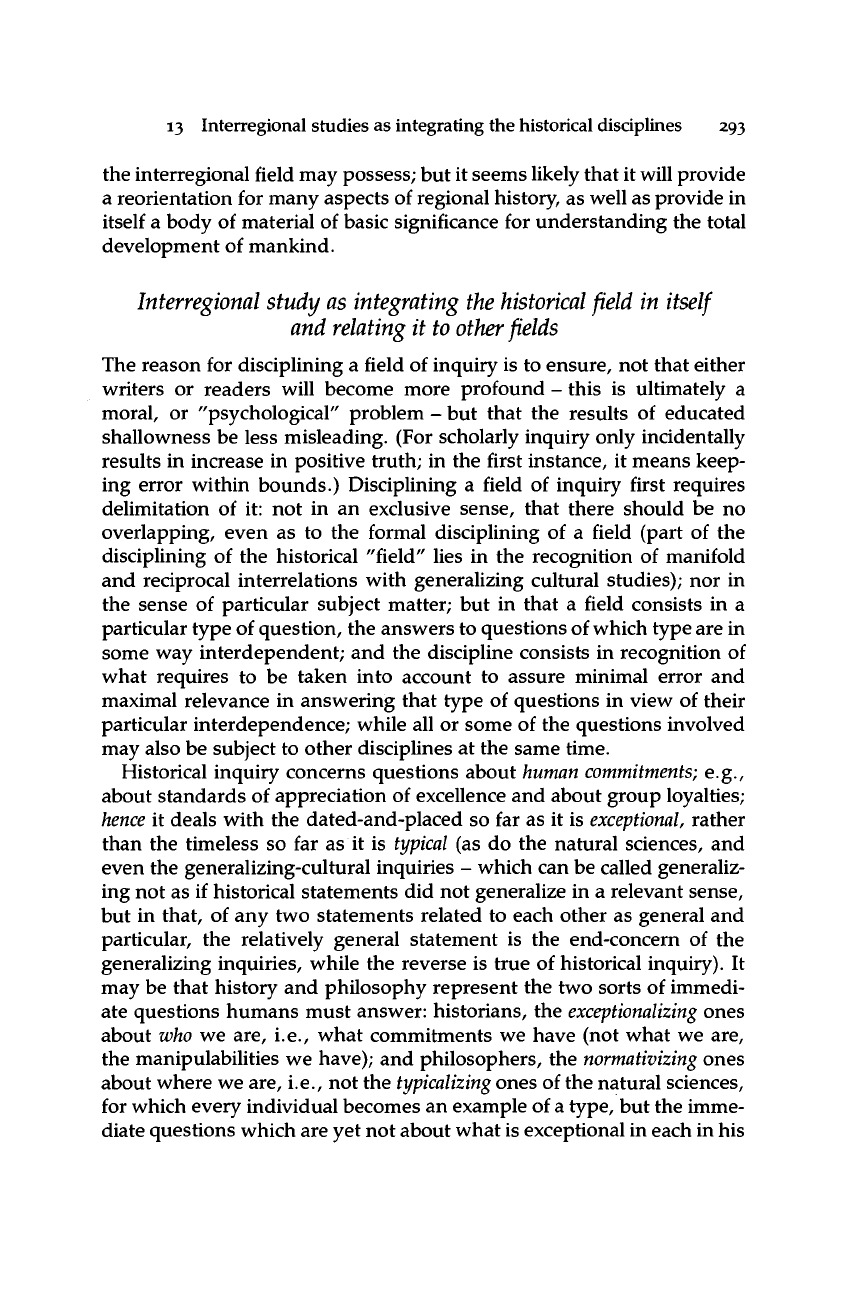
13 Interregional studies as integrating the historical disciplines 293
the interregional field may possess; but it seems likely that it will provide
a reorientation for many aspects of regional history, as well as provide in
itself a body of material of basic significance for understanding the total
development of mankind.
Interregional
study as integrating the
historical
field in
itself
and relating it to
other fields
The reason for disciplining a field of inquiry is to ensure, not that either
writers or readers will become more profound - this is ultimately a
moral, or "psychological" problem - but that the results of educated
shallowness be less misleading. (For scholarly inquiry only incidentally
results in increase in positive truth; in the first instance, it means keep-
ing error within bounds.) Disciplining a field of inquiry first requires
delimitation of it: not in an exclusive sense, that there should be no
overlapping, even as to the formal disciplining of a field (part of the
disciplining of the historical "field" lies in the recognition of manifold
and reciprocal interrelations with generalizing cultural studies); nor in
the sense of particular subject matter; but in that a field consists in a
particular type of question, the answers to questions of which type are in
some way interdependent; and the discipline consists in recognition of
what requires to be taken into account to assure minimal error and
maximal relevance in answering that type of questions in view of their
particular interdependence; while all or some of the questions involved
may also be subject to other disciplines at the same time.
Historical inquiry concerns questions about
human
commitments;
e.g.,
about standards of appreciation of excellence and about group loyalties;
hence
it deals with the dated-and-placed so far as it is
exceptional,
rather
than the timeless so far as it is
typical
(as do the natural sciences, and
even the generalizing-cultural inquiries - which can be called generaliz-
ing not as if historical statements did not generalize in a relevant sense,
but in that, of any two statements related to each other as general and
particular, the relatively general statement is the end-concern of the
generalizing inquiries, while the reverse is true of historical inquiry). It
may be that history and philosophy represent the two sorts of immedi-
ate questions humans must answer: historians, the
exceptionalizing
ones
about who we are, i.e., what commitments we have (not what we are,
the manipulabilities we have); and philosophers, the
normativizing
ones
about where we are, i.e., not the
typicalizing
ones of the natural sciences,
for which every individual becomes an example of a type, but the imme-
diate questions which are yet not about what is exceptional in each in his
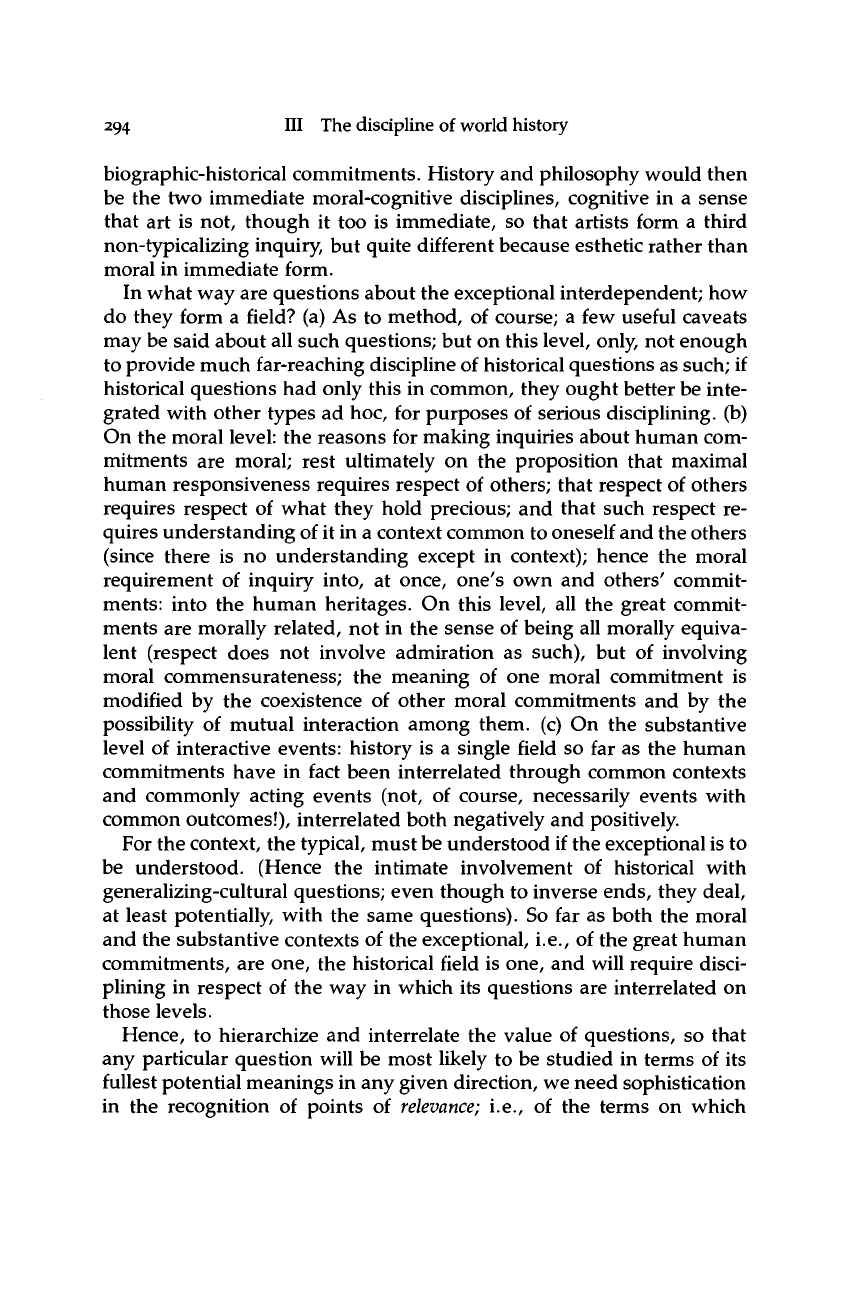
294 HI The discipline of world history
biographic-historical commitments. History and philosophy would then
be the two immediate moral-cognitive disciplines, cognitive in a sense
that art is not, though it too is immediate, so that artists form a third
non-typicalizing inquiry, but quite different because esthetic rather than
moral in immediate form.
In what way are questions about the exceptional interdependent; how
do they form a field? (a) As to method, of course; a few useful caveats
may be said about all such questions; but on this level, only, not enough
to provide much far-reaching discipline of historical questions as such; if
historical questions had only this in common, they ought better be inte-
grated with other types ad hoc, for purposes of serious disciplining, (b)
On the moral level: the reasons for making inquiries about human com-
mitments are moral; rest ultimately on the proposition that maximal
human responsiveness requires respect of others; that respect of others
requires respect of what they hold precious; and that such respect re-
quires understanding of it in a context common to oneself and the others
(since there is no understanding except in context); hence the moral
requirement of inquiry into, at once, one's own and others' commit-
ments: into the human heritages. On this level, all the great commit-
ments are morally related, not in the sense of being all morally equiva-
lent (respect does not involve admiration as such), but of involving
moral commensurateness; the meaning of one moral commitment is
modified by the coexistence of other moral commitments and by the
possibility of mutual interaction among them, (c) On the substantive
level of interactive events: history is a single field so far as the human
commitments have in fact been interrelated through common contexts
and commonly acting events (not, of course, necessarily events with
common outcomes!), interrelated both negatively and positively.
For the context, the typical, must be understood if the exceptional is to
be understood. (Hence the intimate involvement of historical with
generalizing-cultural questions; even though to inverse ends, they deal,
at least potentially, with the same questions). So far as both the moral
and the substantive contexts of the exceptional, i.e., of the great human
commitments, are one, the historical field is one, and will require disci-
plining in respect of the way in which its questions are interrelated on
those levels.
Hence, to hierarchize and interrelate the value of questions, so that
any particular question will be most likely to be studied in terms of its
fullest potential meanings in any given direction, we need sophistication
in the recognition of points of relevance; i.e., of the terms on which
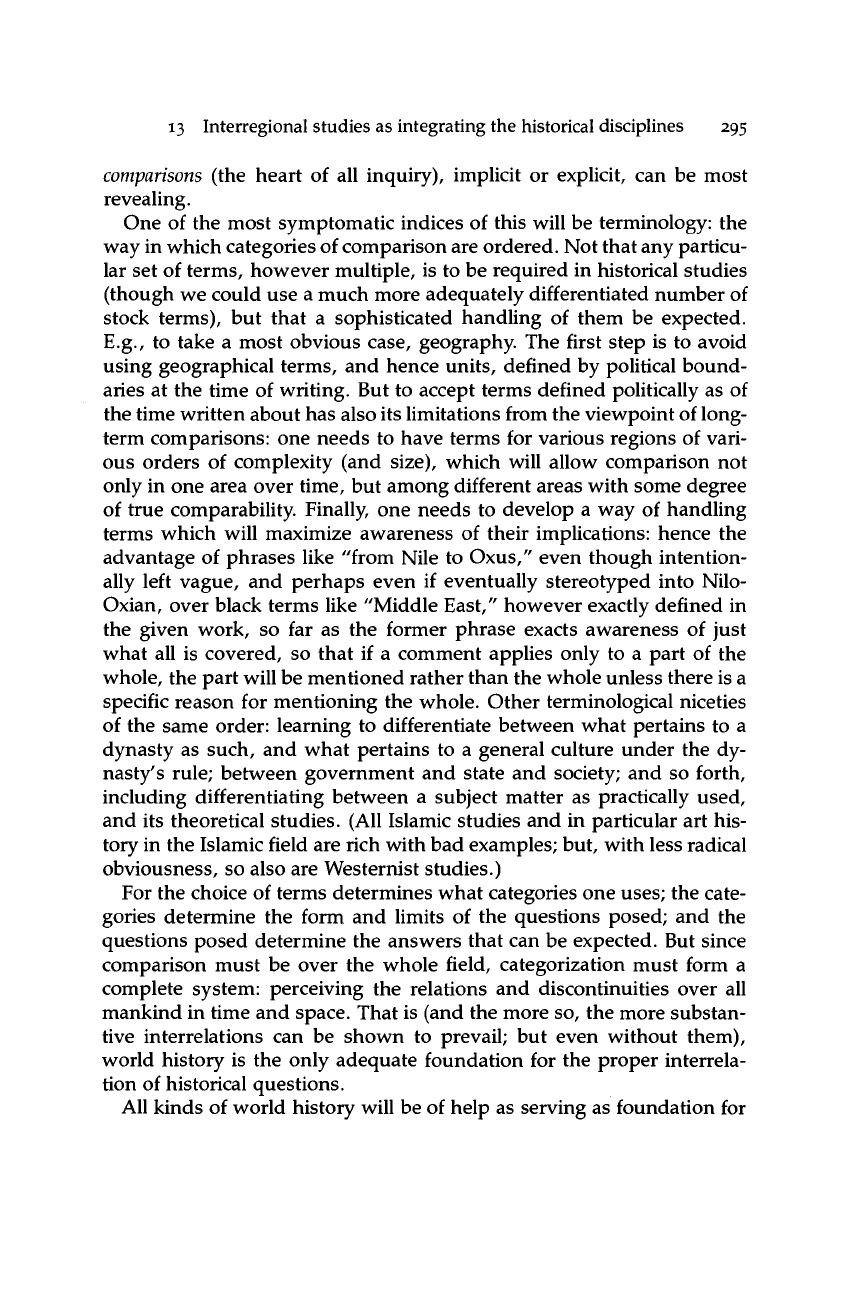
13 Interregional studies as integrating the historical disciplines 295
comparisons
(the heart of all inquiry), implicit or explicit, can be most
revealing.
One of the most symptomatic indices of this will be terminology: the
way in which categories of comparison are ordered. Not that any particu-
lar set of terms, however multiple, is to be required in historical studies
(though we could use a much more adequately differentiated number of
stock terms), but that a sophisticated handling of them be expected.
E.g., to take a most obvious case, geography. The first step is to avoid
using geographical terms, and hence units, defined by political bound-
aries at the time of writing. But to accept terms defined politically as of
the time written about has also its limitations from the viewpoint of long-
term comparisons: one needs to have terms for various regions of vari-
ous orders of complexity (and size), which will allow comparison not
only in one area over time, but among different areas with some degree
of true comparability. Finally, one needs to develop a way of handling
terms which will maximize awareness of their implications: hence the
advantage of phrases like "from Nile to Oxus," even though intention-
ally left vague, and perhaps even if eventually stereotyped into Nilo-
Oxian, over black terms like "Middle East," however exactly defined in
the given work, so far as the former phrase exacts awareness of just
what all is covered, so that if a comment applies only to a part of the
whole, the part will be mentioned rather than the whole unless there is a
specific reason for mentioning the whole. Other terminological niceties
of the same order: learning to differentiate between what pertains to a
dynasty as such, and what pertains to a general culture under the dy-
nasty's rule; between government and state and society; and so forth,
including differentiating between a subject matter as practically used,
and its theoretical studies. (All Islamic studies and in particular art his-
tory in the Islamic field are rich with bad examples; but, with less radical
obviousness, so also are Westernist studies.)
For the choice of terms determines what categories one uses; the cate-
gories determine the form and limits of the questions posed; and the
questions posed determine the answers that can be expected. But since
comparison must be over the whole field, categorization must form a
complete system: perceiving the relations and discontinuities over all
mankind in time and space. That is (and the more so, the more substan-
tive interrelations can be shown to prevail; but even without them),
world history is the only adequate foundation for the proper interrela-
tion of historical questions.
All kinds of world history will be of help as serving as foundation for
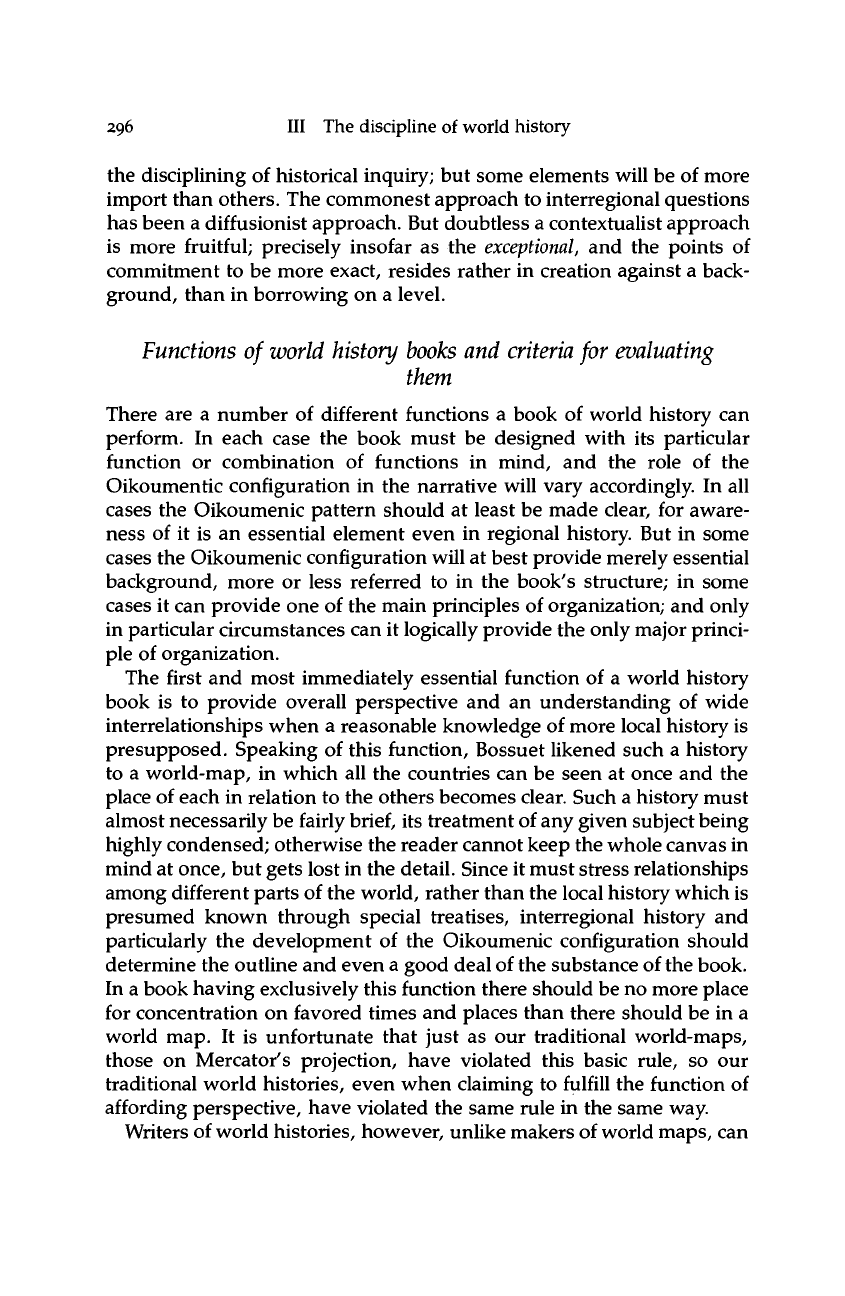
296 III The discipline of world history
the disciplining
of
historical inquiry;
but
some elements will
be of
more
import than others. The commonest approach
to
interregional questions
has been
a
diffusionist approach. But doubtless
a
contextualist approach
is more fruitful; precisely insofar
as the
exceptional,
and the
points
of
commitment
to be
more exact, resides rather
in
creation against
a
back-
ground, than
in
borrowing
on a
level.
Functions
of
world history
books
and
criteria
for
evaluating
them
There
are a
number
of
different functions
a
book
of
world history
can
perform.
In
each case
the
book must
be
designed with
its
particular
function
or
combination
of
functions
in
mind,
and the
role
of the
Oikoumentic configuration
in the
narrative will vary accordingly.
In all
cases
the
Oikoumenic pattern should
at
least
be
made clear,
for
aware-
ness
of it is an
essential element even
in
regional history.
But in
some
cases
the
Oikoumenic configuration will
at
best provide merely essential
background, more
or
less referred
to in the
book's structure;
in
some
cases
it can
provide
one of the
main principles
of
organization;
and
only
in particular circumstances
can it
logically provide
the
only major princi-
ple
of
organization.
The first
and
most immediately essential function
of a
world history
book
is to
provide overall perspective
and an
understanding
of
wide
interrelationships when
a
reasonable knowledge
of
more local history
is
presupposed. Speaking
of
this function, Bossuet likened such
a
history
to
a
world-map,
in
which
all the
countries
can be
seen
at
once
and the
place
of
each
in
relation
to the
others becomes clear. Such
a
history must
almost necessarily be fairly
brief,
its
treatment
of
any given subject being
highly condensed; otherwise the reader cannot keep the whole canvas
in
mind
at
once,
but
gets lost
in the
detail. Since
it
must stress relationships
among different parts
of
the world, rather than the local history which
is
presumed known through special treatises, interregional history
and
particularly
the
development
of the
Oikoumenic configuration should
determine
the
outline
and
even
a
good deal
of
the substance
of
the book.
In
a
book having exclusively this function there should be
no
more place
for concentration
on
favored times
and
places than there should
be in a
world
map. It is
unfortunate that just
as our
traditional world-maps,
those
on
Mercator's projection, have violated this basic rule,
so our
traditional world histories, even when claiming
to
fulfill
the
function
of
affording perspective, have violated
the
same rule
in the
same way.
Writers
of
world histories, however, unlike makers
of
world maps,
can
